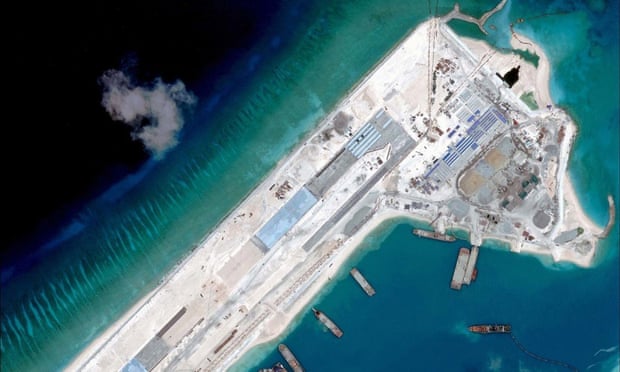An airstrip being built by China on the Fiery Cross Reef in the South China Sea. Photograph: HANDOUT/Reuters
US naval manoeuvres in South China Sea risk clash with Beijing
Officials in Beijing have expressed concern after the United States signalled it was poised to up the ante in the South China Sea by sending warships through waters claimed by China.
American navy vessels are preparing to sail through a 12-nautical mile zone around the disputed Spratly islands that China claims as its own territory, the Financial Times reported on Thursday, citing a senior US official.
Those manoeuvres are expected to begin over the next two weeks, the newspaper added.
Hua Chunying, a Chinese foreign ministry spokesperson, said: “We hope the United States can look upon the current situation of the South China Sea from an objective and fair perspective and play a constructive role together with China in keeping the peace and stability in the South China Sea.”
“I believe the US side is extremely clear about China’s relevant principled stance,” Hua added.
An earlier report in Foreign Policy, which cited an anonymous defence official, claimed Washington was now determined to put on a “show of military might” in the South China Sea.
“It’s not a question of if, but when,” the official was quoted as saying.
Reports of the impendning manoeuvres suggest that US and Chinese officials failed to find any kind of resolution to the standoff in the South China Sea during Xi Jinping’s state visit to Washington last month.
Many experts believe relations between Washington and Beijing have hit their lowest point in years, with tussles and friction over a growing list of issues including cyberespionage, currency manipulation and human rights.
Pentagon officials have for months been urging the White House to take a more robust response to China’s controversial artificial island building campaign and military buildup in the South China Sea.
In May, Ashton Carter, the US defence secretary, said China’s actions were increasing “the risk of miscalculation or conflict” in the region, which is a key global shipping lane.
Those comments earned a rebuke from Beijing, with a foreign ministry spokesperson accusing Carter of “stirring up trouble and slinging accusations”.
At a joint press conference with Xi Jinping last month, Obama said the pair had engaged in “candid discussions” about the South China Sea.
“I conveyed to President Xi our significant concerns over land reclamation, construction and the militarisation of disputed areas, which makes it harder for countries in the region to resolve disagreements peacefully,” Obama said.
“I indicated that the United States will continue to sail, fly and operate anywhere that international law allows,” Obama added.
Xi said: “Islands in the South China Sea since ancient times are China’s territory.”
In a recent interview Orville Schell, the director of the Centre on US-China Relations, said the Obama administration was losing patience with China’s “very forceful, even sometimes belligerent” behaviour.
“I think Washington is probably at something of a tipping point moment with both China and Xi,” Schell said. “I think they are definitely toying with taking a much harder line.”
“What would be the effect of that? I don’t know. I think everybody agrees we have got to find a way to get along with China. But I think Washington may be questioning whether being accommodating, reasonable and [having] endless track two dialogues is actually accomplishing anything.”
“Sending in ships so soon after the summit [between Obama and Xi] is a sign I think of how poorly it went,” China expert Bill Bishop wrote in his Sinocismnewsletter on Friday.
“[It is] hard to see how this ends well, but the only other option for the US is to concede, which will materially damage US credibility in Asia, be viewed by[Chinese] policymakers as further evidence that the US is in terminal decline and be an additional impetus for Beijing to push harder against the US in Asia.”

No comments:
Post a Comment